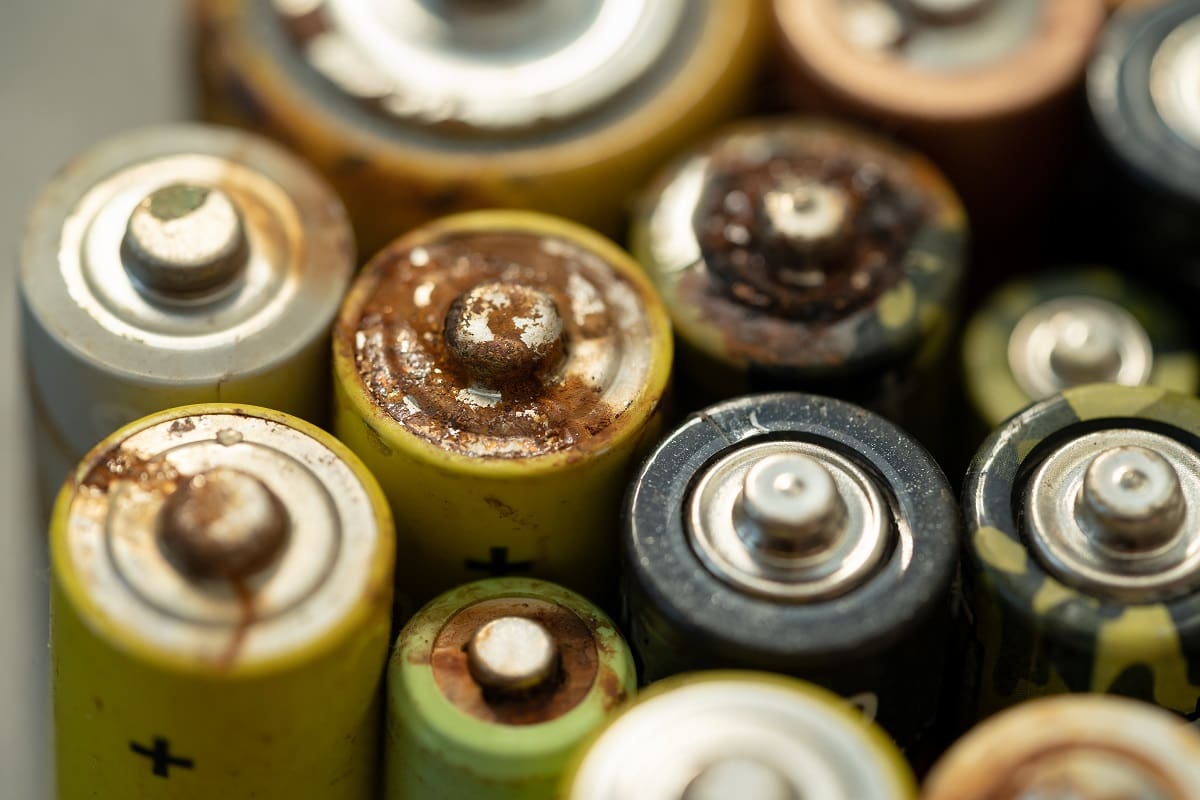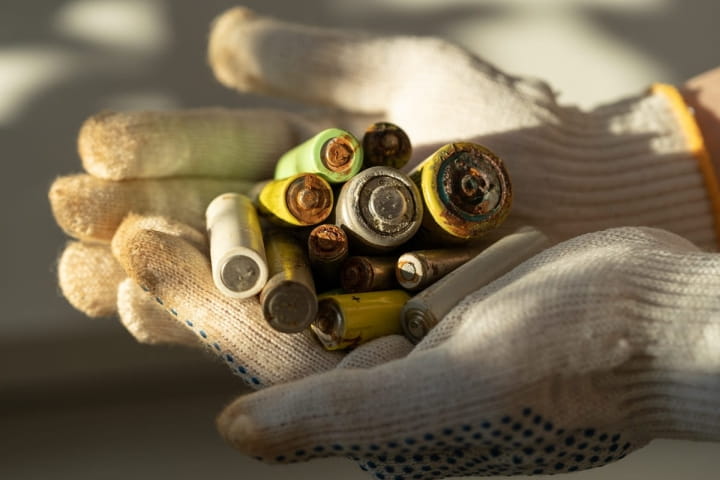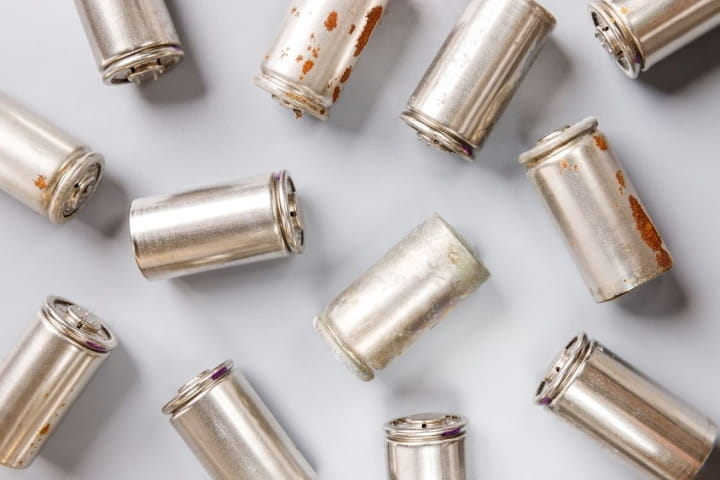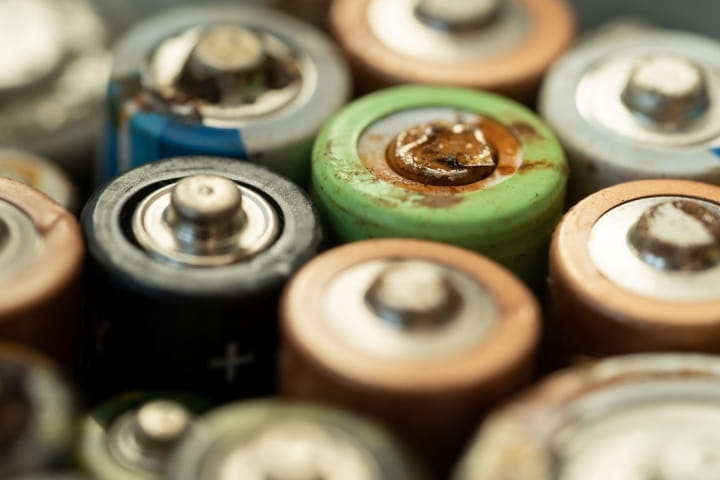
What to do when a battery leaks?
A leaking battery can have fatal consequences. Direct contact with the battery fluid can cause anything from minor irritation and reddening of the skin to severe damage to the mucous membrane, bleeding or malfunctions. But why is this so? And even more importantly, What to do if a battery has leaked? We already learn as children that batteries have a plus and a minus pole. In order for electricity to be generated, electrons have to move from one pole to the other. So-called electrolytes are used to make this happen which act as a bridge or conductive medium within the battery to allow electrons to travel from one pole to the other.
Commonly, electrolytes are found in a liquid state, but in lithium batteries a solid electrolyte is used. If a lithium battery has leaked, massive explosions can occur as the solid substance reacts vigorously with water. Liquid electrolytes are however found in ordinary batteries.

When a battery has leaked, a brown liquid can often be seen. The brownish substance is an acid or alkali, i.e. a liquid with a very high or low pH value. This electrolyte acid or lye can cause a severe reaction when it comes into contact with the skin, as described at the beginning of this article. If you are asking yourself "What to do with a leaking battery?", you can use the following checklist as a guide to avoid endangering yourself and your environment:
Keep calm. If the battery has leaked and no part of your body has been in contact with the battery fluid yet, it is of the utmost priority that you do not make the situation worsen by trying to wipe away the acid or alkali with your hands to prevent damage to appliances or furniture.
- Use gloves. It is best in a battery leakage situation to use disposable gloves as the acid in a battery permanently damages the material. Despite their low density, disposable gloves are quite sufficient to avoid the permanent injuries described above.
- Remove the battery. To avoid further damage, it is essential to remove the battery immediately. Care should be taken to ensure that no further fluid leaks out and, of course, that you continue to avoid coming into contact with the battery fluid.
- Remove the battery fluid. In contrast to the damage that battery fluid can cause in the long term, it is relatively easy and unproblematic to remove. If the contacts are not yet corroded by the fluid, you can use a damp cloth to wipe off the liquid, preferably one that you no longer need.
- Sand off corroded areas. Parts of a device that have been corroded by battery acid can be recognised by greenish discolouration. If the battery has leaked, contacts corroded, the only way out to avoid permanent damage is to sand down the affected areas and remove any residual electrolytes. Green coloured deposits are an indication of leaking batteries. These must be disposed of immediately to prevent further damage.

If these steps have been followed carefully, there is no cause for concern and the danger has been averted. In the worst case, however, it is already too late for these preventive steps. If the battery has leaked, and the skin or mouth has made any contact with the fluid, you should act quickly, because in this case serious injuries may occur. Wash the affected areas of skin with plenty of water to ensure that no battery acid remains on your skin.
Do not swallow any acid residue that gets into your mouth; in the worst case, this can lead to burns of the stomach or intestinal mucosa. Whereas a tasty vinegar dressing on a salad has little effect on the functioning of the stomach and intestines, a high concentration of this acid can cause extensive damage. In cases of swallowed battery fluid, it is essential to consult a doctor.
If a battery is used in an appliance outside the home, the battery has leaked brown liquid but it has made no contact with the skin, follow the above five points to prevent injuries and try to dilute the affected areas with water. Battery acid can not only be a danger to humans; the consequences for the environment are sometimes devastating.
If battery acid finds its way into nature, it can contaminate groundwater and soils, endangering plants, animals, insects and ultimately us humans. Incidentally, there are no significant differences when a lithium battery has leaked, a lead-acid battery has leaked or a zinc-carbon battery has leaked. The batteries usually have the same pH value and are similarly corrosive.
Why do batteries leak?
We will now turn to a frequently asked question: Battery leaked why did this happen? The first possible cause is that the battery has been stored incorrectly which has resulted in damage to the insulating layers, designed to prevent the battery acid from leaking out . This happens more frequently at the two poles of the battery than in the rest of the battery due to diluted density. Incorrect storage conditions can include extremely high or low temperatures. A very old battery can also lose its protective layer due to natural deterioration over time. This is often the case when old zinc-carbon batteries have leaked and their protective layer has become severly compromised after years of usage.
You can recognise a battery which is damaged in this way by the small, salt-like crystals on the surface of the battery, especially at the poles. Direct contact with the air causes the battery fluid to crystallise, developing sticky white crystals that crust over with time. Overall, the simplest preventive measure to avoid battery leakage is to never store the battery in extreme conditions. Modern batteries should last for many years when kept inside a drawer. Batteries in battery-powered devices that are subjected to collisions can, of course, burst open due to shocks or crushing, which also result in a battery leaking brown liquid. It is therefore best to use these devices with care and avoid unnecessary impacts.
How to clean a leaking battery
What to do if a battery has leaked? The battery has leaked in the unit, so how do we clean the unit of any battery acid residue? If the battery in the unit has leaked, the unit should be cleaned of the battery fluid as soon as possible. In some cases, appliances in which electrolytes of a battery have leaked can no longer be salvaged. In particular, thin wires and metallic contacts in a processor can be so damaged by a leaked battery that the device is defective.
If the acid has not yet penetrated far into the interior of the device, you have a high chance of saving the device. After all preventative steps for self-protection have been followed, affected areas can be wiped off and the greenish crystalline crust of corroded electrolytes can be sanded off. Only after all areas have been cleared of any remnants of the battery acid and the green coloured crystals can it be used again without any problems in the long term.
Dispose of a leaking battery
What to do if a battery has leaked? Can I dispose of the leaked battery in the same way as I dispose of used batteries? Most people are aware that a spilled battery is dangerous. After all, batteries have to be disposed of separately, and supermarkets usually have their own collection point for this.

Even laptop and mobile phone batteries can no longer be disposed of in household waste, as rechargeable batteries generate electricity through a similar process. Just like a single-use battery, the rechargeable battery has a liquid conducting medium. If your battery or rechargeable battery in the appliance has run out, you can take it to the usual collection points. It does not matter whether the battery is used or unused, dented, cracked or like new. For the reasons already mentioned, it is however imperative that rechargeable batteries and batteries are not disposed of in household waste; in the case of leaking batteries, this can have serious consequences.
Not all batteries are the same, meaning it is advisable to use a reliable and suitable battery before taking any other preventive measures to avoid harming people, animals and the environment. Here at Electropapa we offer an extensive range of modern, high-quality batteries at affordable prices. See for yourself at: battery



